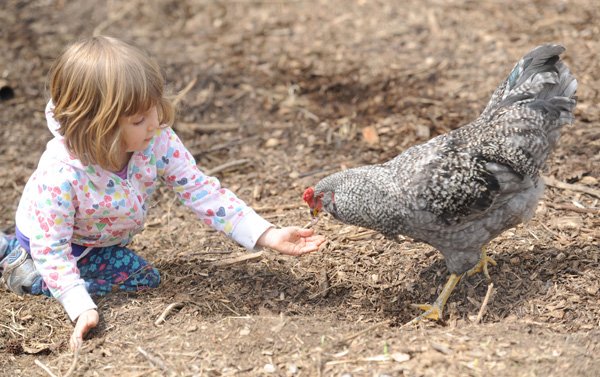In October 2010, Denise Garner was asked to represent Northwest Arkansas at the Arkansas Hunger Relief Alliance in Little Rock. She expected that she would return home from the symposium to ask her Northwest Arkansas friends to help feed children in east Arkansas’ Delta region, one of the poorest in the state.
What she learned stunned her.
Northwest Arkansas has more hungry children than any other part of the state, according to the United States Department of Agriculture. In 2009 Arkansas ranked No. 1 in child hunger in the United States, tied with Mississippi at 19.2 percent.
Share Our Strength, a national nonprofit organization working toward ending childhood hunger in the United States, defines food insecurity as “the limited or uncertain availability of nutritionally adequate and safe food.” The Arkansas Hunger Relief Alliance and Gov. Mike Beebe’s office joined forces to address food insecurity in Arkansas.
Garner brought that mission even closer to home with the creation of Feed Communities, a nonprofit organization dedicated to increasing access to healthy food.
The group works with a host of other organizations to coordinate efforts, increase their ability to operate and reduce duplication of services addressing hunger in Northwest Arkansas. Partners include Tri Cycle Farm, Ozark Slow Food, Cobblestone Project: The Farm and Seeds That Feed.
Feed Fayetteville is a pilot program of Feed Communities.
The group’s mission is “creating food security by cultivating a sustainable local food network.” While Fayetteville has been recognized a number of times by national publications as one of the best places to live, Garner said one in four Fayetteville residents is food insecure.
According to Garner, Feed Fayetteville is designed to be a “model community to see what works and develop best practices” so that it may be replicated in other cities. Five main projects are under way for Feed Fayetteville: Farm to Preschool, SNAP Gardens, Soil Cycles, Canning Hunger and Simply Slow Cooking.
Feed Fayetteville participates in Farm to Preschool, maintaining school gardens at the Ivory M. Conley and Fayetteville centers of EOA Washington County Head Start. The program serves about 75 local children, making fresh produce available while teaching them about gardening. Farm to Preschool is an extension of the national Farm to School program.
SNAP Gardens gives those receiving Supplemental Nutrition Assistance Program benefits (formerly known as food stamps) an opportunity to grow their own food. The benefits may be used to purchase seeds and plants, and Feed Fayetteville’s Community Food Hub on Locust Avenue offers garden plots and guidance to plant and harvest. Don Bennett, founder and director of Tri Cycle Farms, an urban community garden, said, “When you plant food, it’s like printing money.”
Soil Cycles seeks to keep food waste out of landfills. Volunteers collect food waste such as coffee grounds and vegetable scraps on bicycle pulled trailers to turn into compost for use in the organization’s gardens.
Feed Fayetteville also works with area churches on Canning Hunger. Participants learn how to can and preserve food donated by area farms. Marge Wolf, executive director of the Northwest Arkansas Food Bank, praised the group’s salvaging and education efforts. “There’s food out there that people don’t know what to do with,” so teaching them those skills makes a difference.
Simply Slow Cooking is an opportunity for SNAP recipients to learn how to make healthy slow cooker recipes and get a crock pot and a cookbook of healthy slow cooker recipes upon completion of the class.
Melissa Terry, programs coordinator of Feed Communities, said that along with Feed Fayetteville, the umbrella group has plans to launch the publication Edible Ozarkansas. She said the magazine will be “a platform for talking about and celebrating good food, our culture and our area farming community.” The first issue of the free monthly magazine is due out in early fall.
Feed Fayetteville has also taken on a gleaning initiative, working with farmers at Fayetteville Farmers Market to collect excess produce and distribute it to area food pantries. The group gleaned some 17,000 pounds of produce in 2012. Angela Oxford, University of Arkansas director of community engagement, said the produce donated to the campus’s Full Circle Food Pantry “is huge for us.” Not only does it help supplement the packaged foods that are food pantry staples, it gives people who come to them the opportunity to try something new - as was the case last summer when a refrigeratorful of eggplant was donated. There weren’t a lot of takers at first because people didn’t know what to do with it, but when the pantry created accompanying recipe cards, eggplant parmesan was a hit.
“This is the American dream - not entitlement and expectation and a lot of stuff ,” Bennett said of organizations like Feed Communities and Tri Cycle Farms. “It’s about our ability to plant a seed, grow our own food and take care of our families and take care of each other.”
The second annual Fayetteville Foam Fest on May 4 will benefit Feed Fayetteville’s programs. The craft beer festival and tasting boasts more than 250 craft brews. The lager lineup includes samples from local breweries, among them West Mountain Brewery, Tanglewood Branch, Core, Fossil Cove Brewery and Saddlebock. VIP tickets are $60, festival passes are $30, and designated drivers get in for $10. VIP ticket holders get early admission and a food and beer pairing.
Life, Pages 8 on 04/24/2013

